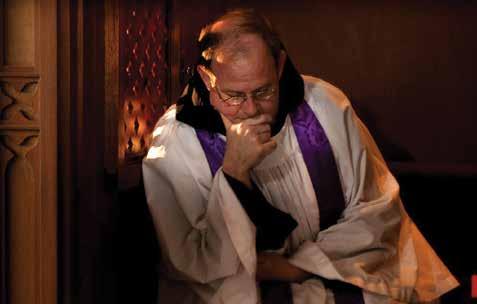
3 minute read
Questions of Faith
Comment
Father Joshua Rodrigue, S.T.L.
Fear of confession
I have always had a fear of going to confession. I get so scared that I just say the first thing that comes to mind just to get it over with. Our pastor knows everyone and that’s part of the problem. I’ve tried to go to another parish, but that didn’t help. I don’t feel like I’ve ever really made a good confession in my entire life. Can Jesus forgive me for this?
I don’t think most people like going to confession in the first place. I don’t have people doing cartwheels coming into the confessional, and most people are normally a little anxious before going. Even as a priest, my heart starts to beat a little faster when preparing to make my regular confession.
That nervousness is a good indication that we are taking the sacrament seriously. And yet, all of us need to pray for an increase in the virtue of fortitude to enter the confessional. Fear, embarrassment, pride and other vices try to convince us to stay away from the peace and joy we receive from the Lord’s compassionate forgiveness.
A proper preparation with an examination of conscience can help us make a good confession. There are a number of them found on the internet or even apps that can be downloaded to a smartphone to help. I even recommend a daily examination of conscience so that a person can better recognize his or her “favorite sins,” or in other words, the sins that seem to occur regularly. Then when it is time to go to confession, a person is familiar with his or her sinfulness.
Take time also to examine your conscience and write them down if you are afraid to forget them. I have heard some priests say that they hate the “grocery list” confession because they question the person’s true contrition; however, I see it differently. I see it as people taking the time to examine their conscience and wanting to make a thorough and sincere confession. That paper can then be given to the priest afterward to destroy or you can do it yourself.
While people have spent time tallying up their sins before entering the confessional, when the time comes for them to celebrate the sacrament, suddenly there is the moment of “confession amnesia” as we priests hear, “Father, I had all these things I wanted to confess, but now I can’t remember them.” Don’t panic. The priest can walk you through the commandments, the deadly sins, or ways in which you have failed to love God, your neighbor or yourself.
Fear is the greatest deterrent. If you are afraid to go because you can’t remember an Act of Contrition, often there is one posted in the confessional, or the priest can help you. And if the fear is going to your pastor for confession, then know you are allowed to go anonymously behind a screen to him and do not have to go face to face. Even if you go face to face, keep in mind that the priest hears many confessions, so don’t think that your sins are so special that he will remember them.
Actually in the end, the difficult part of the sacrament is not so much going to confession but once we leave the confessional. Will I go back to my old ways or become the person God wants me to be? Remember, the more regularly you practice going to confession, the more comfortable you will become. Do not let fear keep you away; the peace afterward is worth being a little nervous before. BC










